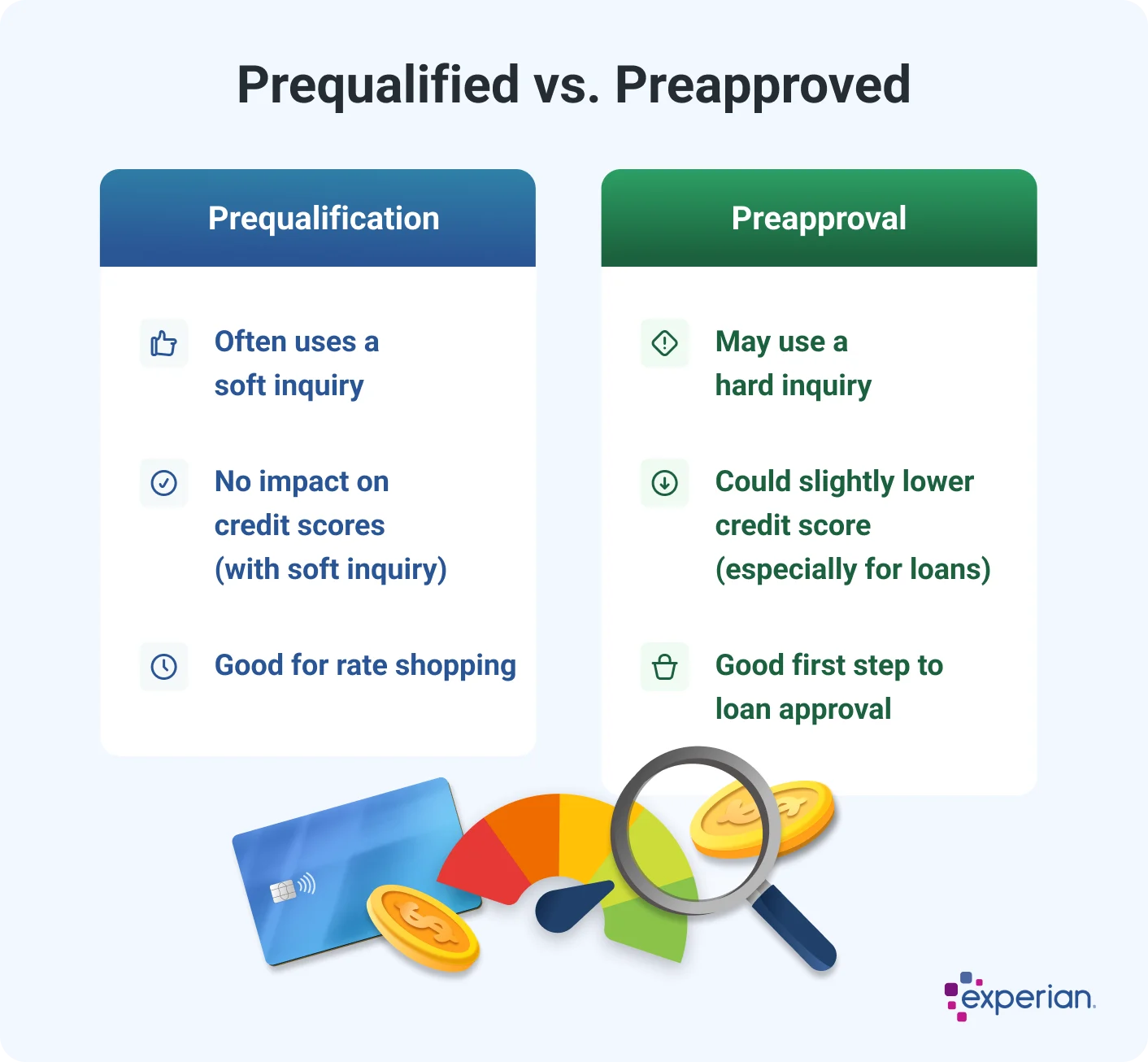Prequalified vs. Preapproved: What’s the Difference?
Quick Answer
The difference between preapproval and prequalification can depend on the creditor and the type of loan or credit card. Generally, prequalification involves a basic review of your creditworthiness to determine if you’re likely to qualify for a loan or credit card. Preapproval may be a more rigorous process and can sometimes be a better indication that you’ll get approved.

The difference between preapproval and prequalification can depend on the creditor and the type of loan or credit card—some creditors may even use the terms interchangeably.
In either case, a creditor has done an initial assessment to determine if you'll likely get approved for a new loan or credit card. It may then offer you potential interest rates, terms and loan amounts based on the assessment.
Prequalification tends to refer to less rigorous assessments, while a preapproval can require you to share more personal and financial information with a creditor. As a result, an offer based on a prequalification may be less accurate or certain than an offer based on a preapproval.
Here's what you need to know about how prequalification and preapproval work, plus the differences to consider.
Prequalified vs. Preapproved
Neither prequalification nor preapproval is a guarantee that you'll ultimately qualify for a loan or credit card. In the case of credit card offers, prequalification and preapproval are often used interchangeably by lenders.
When it comes to loans, here's how prequalification and preapproval compare.
| Prequalification | Preapproval | |
|---|---|---|
| Credit check | If a credit report is reviewed, it typically results in a soft credit inquiry that doesn't affect credit scores | Typically results in a hard inquiry |
| Process | Review of basic information, such as income and credit | May be an in-depth review of tax returns, income, bank statements and credit |
| Approval impact | Does not guarantee approval | Does not guarantee approval |
| Accuracy | May be less accurate than a preapproval offer | May be more accurate than prequalification because the lender reviews more information |
| Purpose | Can help you weigh your options before applying for credit | Can be the first step to securing a loan approval letter for a mortgage |
| Timeline | Results are often instant | May take days for manual review to complete |

What Does Prequalified Mean?
Prequalification means the creditor has done at least a basic review of your creditworthiness to determine if you're likely to qualify for a loan or credit card. Consumers may initiate this process when they submit a prequalification application for a loan or card.
Requirements for prequalification can vary depending on the situation. It may involve sharing basic information about your financial situation, such as your annual income, monthly housing payment and savings. For some prequalifications, lenders will check your credit using a soft inquiry—the type of inquiry that doesn't impact your credit scores.
Once you're prequalified, you can choose to apply and undergo a complete review process. The review may require you to submit official documents, rather than estimates, and agree to a hard credit inquiry, which can impact your credit scores.
What Does Preapproved Mean?
Getting preapproved may be a better indication that you'll get approved for a loan or card—but it depends on the process.
Credit Card and Personal Loan Preapproval
If you're preapproved for a credit card online, the card issuer may be using preapproved and prequalified to mean the same thing.
Additionally, you may have received preapproval offers for loans or credit cards by mail, phone or email. These prescreened offers generally mean you appeared on a credit reporting agency's list of consumers that meet a creditor's criteria and have been sent a firm offer of credit as a result.
If you respond to the offer and apply, the creditor must offer you the same terms as in the mailing. But those terms may have a range, and you won't know your exact offer until you apply and agree to a hard inquiry. In some cases, the lender may decide to decline your application once they have a chance to thoroughly review your credit report, credit scores and the information you provided in your credit application.
Tip: Whether you applied or received an unsolicited offer saying you're preapproved, there's still no guarantee you'll get approved—especially if factors like your income, collateral or credit history have recently changed.
Compare personal loan rates
Find APRs from 4.99% to 35.99% and flexible terms of 12 to 120 months. Loan amounts range from $1,000 up to $250,000, with funding available the same day or up to 3 days.
Offers from our partners
View all of our Best Personal Loans for 2026 to see what you’re likely to qualify for, and the rates and terms you might get.
Mortgage and Car Loan Preapproval
Mortgage and car loan preapprovals are different from preapproval for other types of credit and can involve a fairly complex application and review process. You may need to submit tax returns, proof of income and bank statements, and agree to a credit check. The mortgage or auto lender could take some time to review and verify these documents. Then, they may then offer you a loan preapproval letter that's good for several months.
Learn more: Hard Inquiry vs. Soft Inquiry: What's the Difference?
Does Getting Prequalified or Preapproved Guarantee Approval?
Getting prequalified or preapproved doesn't guarantee an approval, but it's a promising sign that your chances of approval are good. However, if your financial standing changes after you get prequalified or preapproved, a lender may deny your application.
Do Preapproval and Prequalification Offers Impact Credit Score?
With credit cards, neither prequalification nor preapproval offers will impact your credit scores because with either process, a credit check usually results in a soft inquiry.
Auto loans and mortgages are different, however, and will typically result in a hard inquiry on your credit that may hurt your credit scores. Fortunately, if it does, it's often a small impact that only lasts for a few months, although the inquiry itself will remain on your report for two years.
Tip: Keep in mind that if you're rate shopping for an auto or home loan, credit scoring models will treat all hard inquiries as one if made in a 14-day period (some models allow up to 45 days). So if you are shopping around for the best rate with different lenders within a short period of time, your credit will suffer little, if any, damage.
Can I Opt Out of Credit Card and Loan Offers?
Yes, you can opt out of credit card and loan offers. If you're receiving prescreened credit or insurance offers, you can opt out for a five-year period or permanently by calling 888-567-8688 or visiting OptOutPrescreen.com. It can take up to 65 days for you to stop receiving these offers once you opt out.
Opting out will stop offers sent based on information in your credit report, but it won't stop all forms of prescreened offers. For example, some companies send offers based on marketing lists or mass mailings to residents of certain areas. You may be able to opt out of those lists by directly contacting the company that sent you the offer.
Learn more: How Do I Stop Receiving Credit Card Offers in the Mail?
Rate Shop for the Best Deal
If you're looking for a loan or credit card, getting prequalified or preapproved could be a smart first step. You'll know upfront whether you're likely to get approved or denied and can see your estimated rates and terms. You can also browse credit cards you're prequalified for to compare and find the best offers based on your credit.
Don’t apply blindly
Apply for credit cards confidently with personalized offers based on your credit profile. Get started with your FICO® Score for free.
See your offersAbout the author
Louis DeNicola is freelance personal finance and credit writer who works with Fortune 500 financial services firms, FinTech startups, and non-profits to teach people about money and credit. His clients include BlueVine, Discover, LendingTree, Money Management International, U.S News and Wirecutter.
Read more from Louis